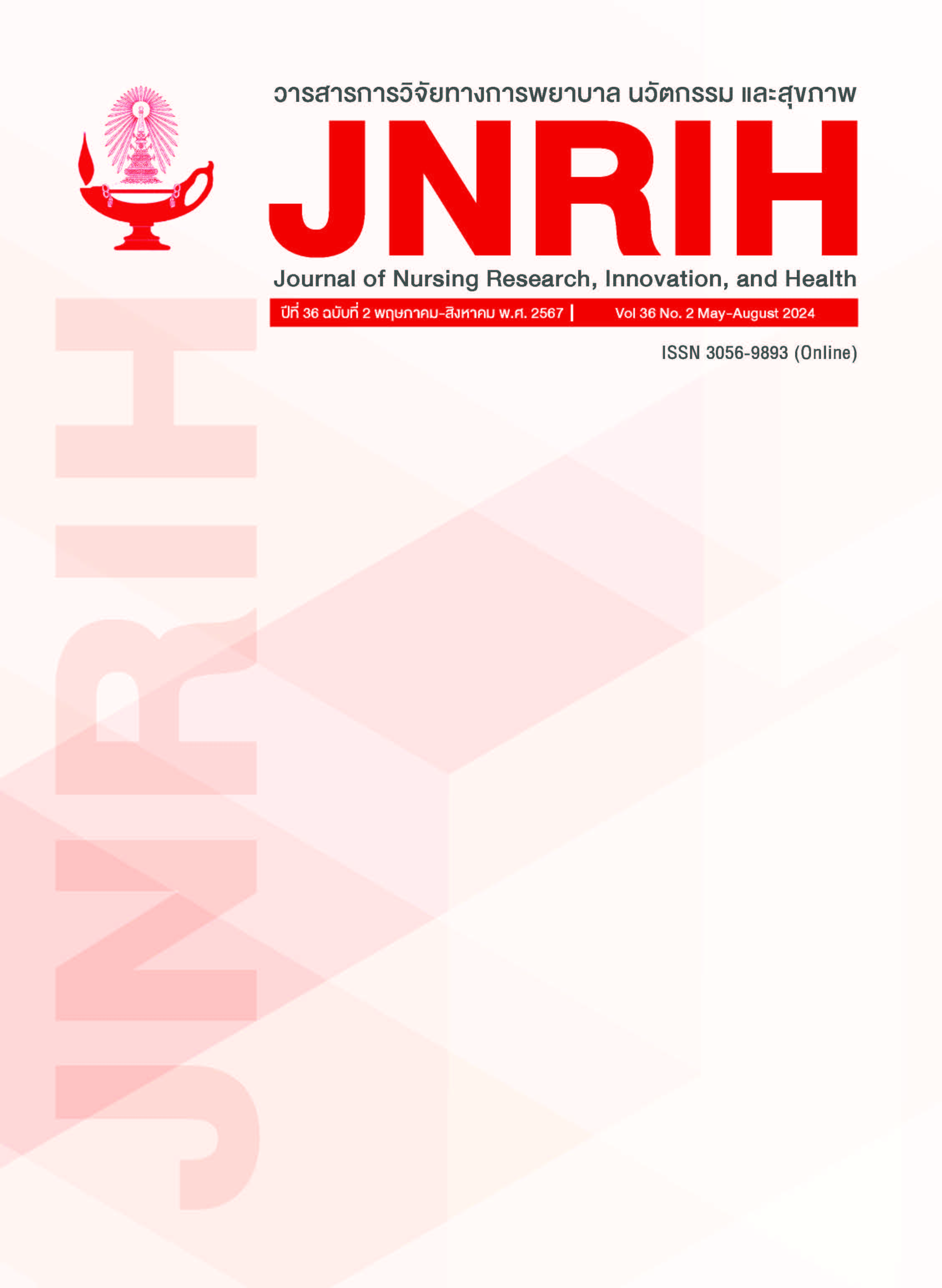ปัจจัยคัดสรรที่สัมพันธ์กับความวิตกกังวลเกี่ยวกับความตายของ ผู้ที่เป็นมะเร็ง
คำสำคัญ:
ความวิตกกังวลเกี่ยวกับความตาย, ผู้ที่เป็นมะเร็ง, ความตายบทคัดย่อ
วัตถุประสงค์: ศึกษาความวิตกกังวลเกี่ยวกับความตาย และความสัมพันธ์ระหว่าง อายุ เพศ ระยะและชนิดของโรคมะเร็ง สัมพันธภาพในครอบครัว ความเชื่อทางศาสนาพุทธเกี่ยวกับความตาย สมรรถนะแห่งตน ภาระค้างคา ความรุนแรงของอาการกับความวิตกกังวลเกี่ยวกับความตายของผู้ที่เป็นมะเร็ง
รูปแบบการวิจัย: วิจัยเชิงบรรยายแบบหาความสัมพันธ์
วิธีดำเนินการวิจัย: กลุ่มตัวอย่าง คือ ผู้ที่เป็นมะเร็งทุกระยะและทุกชนิดมีอายุ 18 ปีขึ้นไป ที่รับการรักษาแผนกผู้ป่วยนอกมะเร็งของโรงพยาบาลรามาธิบดี และสถาบันมะเร็งแห่งชาติ จำนวน 181 คน เครื่องมือที่ใช้ในงานวิจัย เป็นแบบสอบถามข้อมูลส่วนบุคคล ความวิตกกังวลเกี่ยวกับความตาย สัมพันธภาพครอบครัว ภาระค้างคา ความเชื่อทางศาสนาเกี่ยวกับความตาย สมรรถนะแห่งตน และความรุนแรงของอาการ มีค่าสัมประสิทธิ์แอลฟาของครอนบราค เท่ากับ .85, .91, .84, .72, .86 และ .87 วิเคราะห์สัมพันธ์ใช้สถิติเพียร์สันและอีต้า
ผลการศึกษา: ผู้ที่เป็นมะเร็งมีความวิตกกังวลเกี่ยวกับความตายระดับสูงคะแนนเฉลี่ย 46.11 (SD = 10.80) ปัจจัยที่มีความสัมพันธ์สัมพันธ์ทางบวกกับความวิตกกังวลเกี่ยวกับความตาย ได้แก่ ระยะของโรคมะเร็ง ภาระค้างคา ความรุนแรงของอาการ และชนิดของโรค (r = .77, r = .86, และ r = .55 ; Eta = .34, p <.05) และปัจจัยที่มีความสัมพันธ์ทางลบ ได้แก่ สัมพันธภาพในครอบครัว ความเชื่อทางศาสนาพุทธเกี่ยวกับความตาย และสมรรถนะแห่งตน (r = -.80 ,r = -.59, r = -.34, p <.05 )
เอกสารอ้างอิง
World Health Organization, International Agency for Research on Cancer. All cancers [Internet]. France: World Health Organization; 2020. Available from: https://gco.iarc.fr/ today/data/factsheets/cancers/39-All-cancers-fact-sheet.pdf
Ministry of Public Health, Strategy and Planning Division. Annaul report 2019. Nonthaburi: Department of Medical Services, Ministry of Public Health; 2019.
Phra Paisal Visalo. Smile and accept death with a calm heart: Train your mind and keep your heart ready for the final journey of life. Bangkok: Aksorn Sampan; 2011. (In Thai).
Punnatorn, R. The Effect of Buddhist Spiritual Care on Spiritual well-being of End Stage Cancer Elderly Patients. J Nursing Science Chulalongkorn University, 2016; 28(3): 31-43 (In Thai).
Lonetto R, Templer DI. Death Anxiety. [Michigan]: Hemisphere Publishing Corporation; 1986. 155 p.
Conte HR., Weiner, MB, Plutchik, R. Measuring death anxiety: conceptual, psychometric, and factor-analytic aspects. J Pers Soc Psychol. 1982;43(4):775-85.
Bastani F, Farnood F, Haqhani H. Evaluation of death anxiety in elderly patients with cancer undergoing chemotherapy. JCCNC. 2016 Aug 1;2(3):153-60.
Jitjai, S. Selected Factors Related to the Quality of Death of Persons with terminal cancer as Perceived by family Caregivers. J Nursing Science Chulalongkorn University, 2017; 29(2): 112-123. (In Thai).
Neel C, Lo C, Rydall A, Hales S, Rodin G. Determinants of death anxiety in patients with advanced cancer. BMJ supportive & palliative care. 2015 Jan 1; 5(4):373-80.
Vehling S, Malfitano C, Shnall J, Watt S, Panday T, Chiu A. A concept map of death-related anxieties in patients with advanced cancer. BMJ Supportive and Palliative Care. 2017 Dec 1;7(4):427-34.
Kongsaman P. Factors related to death anxiety among family cargivers of advanced cancer patients. [master’s thesis]. Bangkok: Chulalongkorn University; 2017. 154 p. (In Thai).
Gong Y, Yan Y, Yang R, Cheng Q, Zheng H, Chen Y. Factors influencing death anxiety among Chinese patients with cancer: a cross-sectional study. BMJ open 2022 Oct 13;12(10):e064104. doi:10.1136/bmjopen-2022-064104
Hong Y, Yuhan L, Youhui G, Zhanying W, Shili Z, Xiaoting H. Death anxiety among advanced cancer patients: a cross-sectional survey. Supportive Care in Cancer. 2022 Apr 1;30(4):3531-9.
Maliwon K. Factors associated with acceptance of death in patients with advanced cancer. [master’s thesis]. Bangkok: Chulalongkorn University; 2018.
Rangsikosai S, Piphatvanicha N, Paokunha R. Sarapee R. Factors related to behavior for preparing to cope with dying and death among older adults in the Elderly Club Pattani Province. Songklanagarind Journal of Nursing. 2013;33(1):43-56. (In Thai).
Chinda M, Jaturapatporn D, Kirshen AJ, Udomsubpayakul U. Reliability and validity of a Thai version of the edmonton symptom assessment scale (ESAS-Thai). J Pain Symptom Manage. 2011 Dec 1;42(6):954-960.
Wethini S, Atcharee S. Prediction of drug-addicted adolescents’ adjustment from self-efficacy and social support. Journal of the Psychiatric Association of Thailand, 2003;47(4): 255-265.
Zhang J, Peng J, Gao P, Huang H, Cao Y, Zheng L, Miao D. Relationship between meaning in life and death anxiety in the elderly: self-esteem as a mediator. BMC geriatrics. 2019 Nov 12;19(1):1-8.
ดาวน์โหลด
เผยแพร่แล้ว
ฉบับ
ประเภทบทความ
สัญญาอนุญาต
ลิขสิทธิ์ (c) 2024 วารสารการวิจัยทางการพยาบาล นวัตกรรม และสุขภาพ

อนุญาตภายใต้เงื่อนไข Creative Commons Attribution-NonCommercial-NoDerivatives 4.0 International License.
##default.contextSettings.thaijo.licenseTerms##


